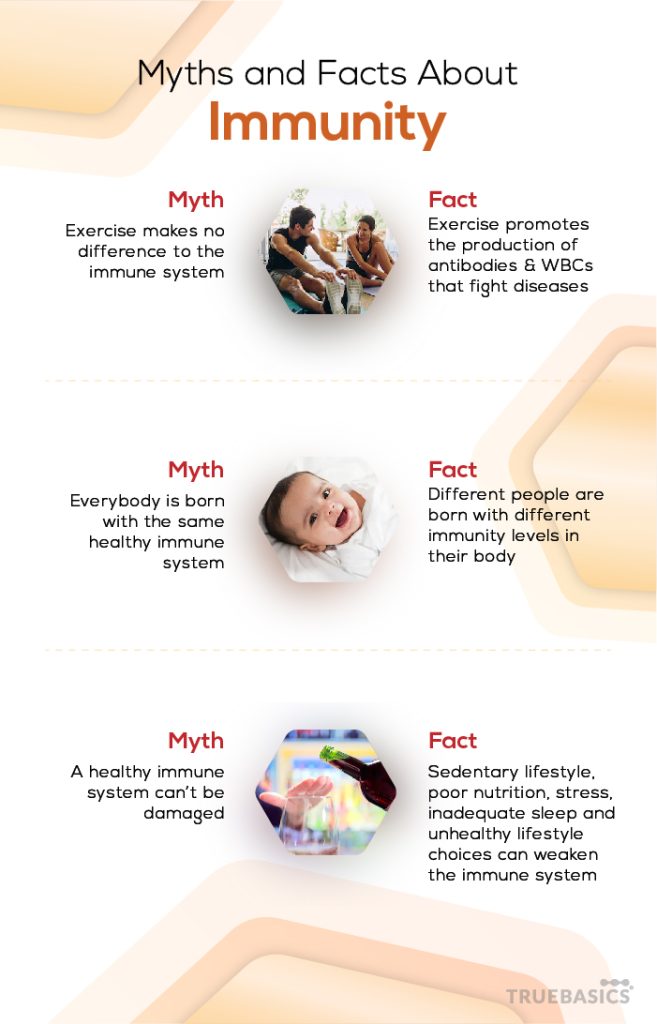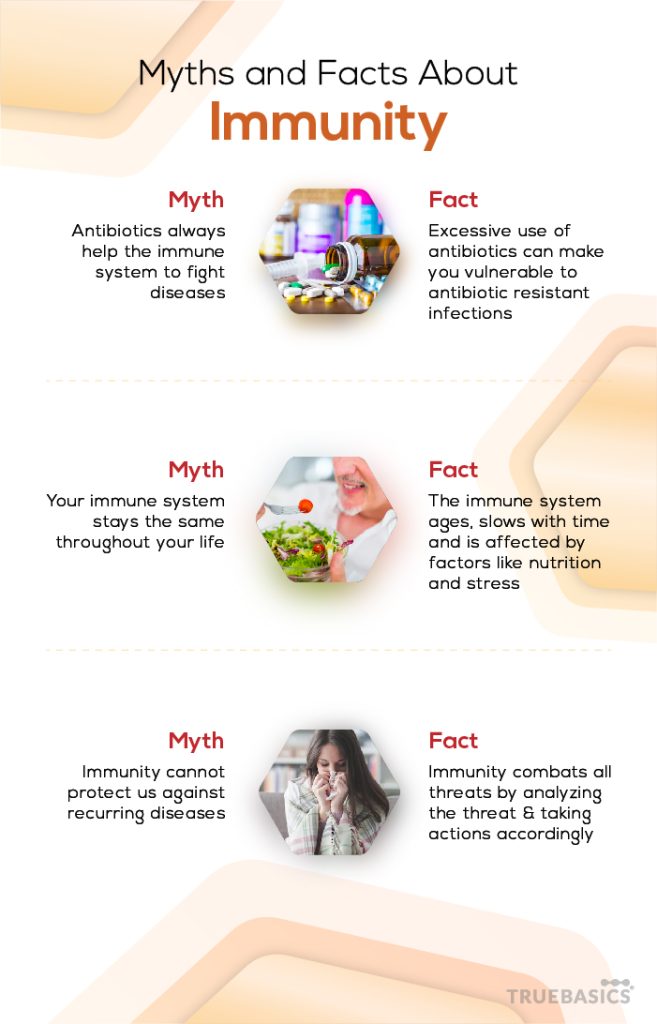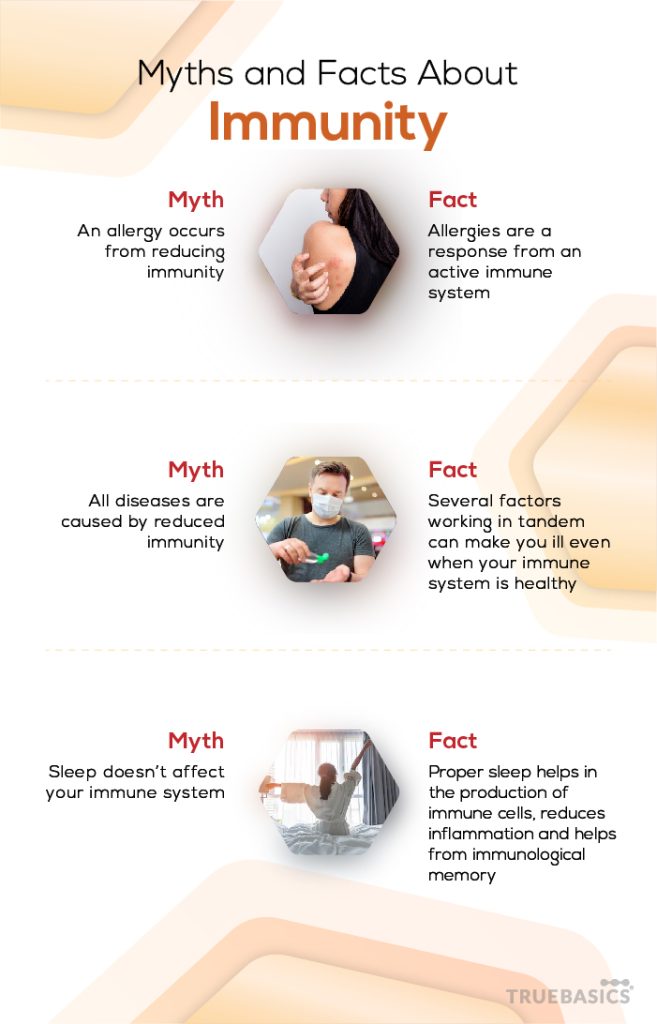Do you believe that citrus fruits can help you recover from a cold? Well, that’s not true. Vitamin C in citrus fruits can help boost your immunity and prevent you from catching infections. However, Vitamin C doesn’t help much once you have contracted an infection. Your immune system is your primary defense and frontline force for fighting against infections. The immune system works to root out germs that have no business in your body.
The immune system is made up of tissues, cells that include your tonsils, your digestive system, skin, bone marrow, spleen, lymph nodes, and the thin skin on the inside of your nose and throats. Fundamentally, immunity looks after each body cell of the human body. The immune system, therefore, consumes a lot of resources to produce the cells that the body needs to function effectively. The immune system learns from past infections, enabling your body to fight off future invaders.
However, with a large amount of information available, a lot of myths and misinformation have sprung up around immunity. Wondering what are the common myths around immunity and if you have had any of them. Read along to find out and dispel mythical notions around immunity.
Myth #1: Exercise makes no difference to the immune system
Fact: Exercise promotes the production of antibodies and white blood cells that fight diseases.
You do not have to be a marathoner, but a consistent daily activity can do the trick. Regular exercise helps your immune system perform at an optimum level. Moderately exercising every other day cuts down the instances you get cold as regular exercises cause a rise in white blood cells [1]. Regular exercise also boosts circulation, allowing healthy cells to move freely, and helps keep low stress levels.
Myth #2: Everybody is born with the same healthy immune system
Fact: Different people are born with different immunity levels.
Everyone has a different immune system. Genetics also affects innate immunity. According to a study, about 20%-40 % of the differences in our immune system are developed due to genetics [2]. Some people are also born with a weak immune system in a condition called primary immune deficiency. Some also have an overactive immune system called the autoimmune system. [3]
Myth #3: A healthy immune system cannot be damaged
Fact: Sedentary lifestyle, poor nutrition, stress, inadequate sleep, and unhealthy lifestyle choices can weaken the immune system.
You are born with a certain level of immunity and develop adaptive immunity as you age, but it is not resistant to damage. Your lifestyle affects how well your immune system protects your body. Factors like a sedentary lifestyle, unhealthy diet, smoking, excessive alcohol drinking, inadequate sleep can weaken your immune system and make you more susceptible to infections. Include healthier habits with a balanced diet, regular exercise, and adequate sleep for an improved immune system. [4]

Myth #4: Antibiotics always help the immune system to fight diseases
Fact: Excessive use of antibiotics can make you vulnerable to antibiotic resistant infections.
Your adaptive immunity is like modern machinery, the more it is used, the more it learns and the more efficient it is in fighting future infections. Your immune system literally learns by fighting infections. Antibiotics help the immune system when it is not able to fight infections on its own. However, excessive use of antibiotics can lead to an increase of antibiotic resistance which negates the efficacy of both antibiotics and the immune system. Overuse also leads to a stunted immune system that does not get enough time to fight infection and create antibodies for future infections. Also, antibiotics help only with bacterial infection and not viruses. Viral borne health issues like cold, flu, bronchitis cannot be cured by antibiotics. Antibiotics help by targeting the growth pattern in bacteria; however, viruses replicate differently. Therefore, make sure you take only essential antibiotics, complete prescribed medications, and get vaccinations to help your immune system to build your immunity [5] [6].
Myth #5: Your immune system stays the same throughout your life
Fact: The immune system ages, slows with time, and is affected by factors like nutrition and stress.
As you age, your immune system tends to get weaker and you are more vulnerable to new infections and previously encountered antigens. Studies have suggested a decline in the production of antibodies (T and B cells) in elderly individuals [7]. Older people tend to get sick more often and they also recover slowly. Older people are more prone to infections because of conditions like heart diseases, hypertension, diabetes, etc. that put on additional stress on your immune system.
Myth #6: Immunity cannot protect us against recurring diseases
Fact: Immunity combats all threats by analyzing the threat and acting accordingly.
The body forms immunity when it is attacked by an infection. The immunological memories, that form once the infection is over, help combat the infections that have occurred in the past when they reoccur. However, sometimes the infection-causing agent mutates to a new, stronger strain and thus affects the body differently. There are around 200 types of continuously changing viruses associated with common cold [8]. This is the reason the flu reoccurs at different times. It attacks differently with a different strain.

Myth #7: An allergy occurs from reducing immunity
Fact: Allergies are a response from an active immune system.
Allergic reactions are responses triggered by the immune system in reaction to potential allergens. Usually, the allergens are harmless, like pet dander, pollen, or mold. Your system views the allergen as an invader, therefore attacking it. You get a runny nose and itchy eyes. Seasonal allergies can get a reaction from the immune system. Allergies are treated by avoiding your allergy triggers. You also need to take your medication. With time, the anti-allergy shots learn to cushion the immune system, and it does not release the bothersome allergens. This, in turn, helps to build the body’s immunity against the allergens.
Myth #8: All diseases are caused by reduced immunity
Fact: Several factors working in tandem can make you ill even when your immune system is healthy.
Infections can threaten your body at any time. When your immune system is working at its best, you can still contract infections. You might think this is probably due to reduced immunity but that is not the case. Even in an active immune system, pathogens can bypass the first protection layers (skin, mucous, etc.) due to unhygienic conditions, contact with sick persons, or various other factors. On the other hand, some diseases are not caused by the pathogens, they are in fact responses by the immune system to fight off the underlying pathogens. For example, fever is not caused by a pathogen, it is the body response to fight infection. Elevated temperatures help speed up the functioning of protective cells at the same time they also make living conditions hostile for the bacteria or viruses to survive. [9]
Myth #9: Sleep does not affect your immune system
Fact: Proper sleep help in the production of immune cells, reduces inflammation, and helps form immunological memory.
Sleep is a crucial part of life. Your body is still working when you are asleep – the muscles repair themselves; the brain sweeps out waste, and your body releases hormones for every function in your body. Getting 7 – 8 hours of sleep helps fortify your immune system, aids in the production of immune cells, reduces inflammation, and helps form immunological memory. Therefore, having a good night’s sleep is essential to help your immunity regenerate. [10]

In Conclusion…
Immunity is responsible for your body’s ability to run bodily functions effectively. Enough sleep is necessary to rejuvenate the body cells and immunity. Make sure you eat a balanced diet so that your immune cells can get the key nutrients they need to maintain optimal functions. Exercise at least 20 – 30 minutes on a regular basis. Cut down on alcohol and smoking. Stress will cause your immune system to malfunction rapidly, de-stress yourself, and practice stress relieving techniques. Also, while it may seem of low relevance, maintain high standards of hygiene.
There is a
plethora of information available around us, however, there is a lot of
misinformation and wrong advice mixed in as well. Arm yourself with the right
information and protect our immune system so that it can ultimately protect you
from infections.
Sources:
[1] Exercise and the common cold” https://www.webmd.com/cold-and-flu/cold-guide/exercise
[2] https://www.sciencedaily.com/releases/2016/09/160929132450.htm
[3] https://www.webmd.com/parenting/baby/news/20180824/newborns-immune-systems-ramp-up-after-birth
[4] https://www.health.harvard.edu/staying-healthy/how-to-boost-your-immune-system
[5] https://www.cdc.gov/patientsafety/features/be-antibiotics-aware.html
[6] https://www.webmd.com/cold-and-flu/cold-guide/antibiotics-colds#1
[7] https://www.ncbi.nlm.nih.gov/pmc/articles/PMC3582124/
[8] https://www.ncbi.nlm.nih.gov/pmc/articles/PMC3215607/
[9] https://www.webmd.com/cold-and-flu/qa/does-having-a-fever-when-youre-sick-weaken-your-immune-system
[10] How sleep affects your health” https://www.webmd.com/sleep-disorders/poor-sleep-affects-health#3













